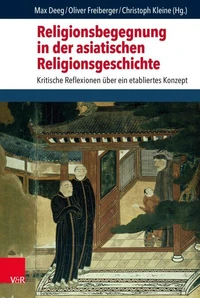Buddhismus. Handbuch und kritische Einführung
Par : ,Formats :
Disponible dans votre compte client Decitre ou Furet du Nord dès validation de votre commande. Le format PDF est :
- Compatible avec une lecture sur My Vivlio (smartphone, tablette, ordinateur)
- Compatible avec une lecture sur liseuses Vivlio
- Pour les liseuses autres que Vivlio, vous devez utiliser le logiciel Adobe Digital Edition. Non compatible avec la lecture sur les liseuses Kindle, Remarkable et Sony
 , qui est-ce ?
, qui est-ce ?Notre partenaire de plateforme de lecture numérique où vous retrouverez l'ensemble de vos ebooks gratuitement
Pour en savoir plus sur nos ebooks, consultez notre aide en ligne ici
- Nombre de pages536
- FormatPDF
- ISBN978-3-647-50005-8
- EAN9783647500058
- Date de parution11/03/2015
- Protection num.pas de protection
- Taille5 Mo
- Infos supplémentairespdf
- ÉditeurVandenhoeck & Ruprecht
Résumé
In this volume the authors offer a modern introduction to the history and multilayered teachings and practices of Buddhism. It provides an overview of the historical development of Buddhism in both Asia and the Western hemisphere as well as treating a number of other subjects: the Buddhistic language and texts, its worldview, religious practices, social forms, views of government and politics, economics, art, architecture, modernisation and globalisation as well as its interactions with other religions.
Numerous examples serve to illustrate the diversity of Buddhist tenets on matters of history and modern life. The volume shows that the widely held positive attitude in the West twoard Buddhism as teaching a peace-loving, detached and meditative enlightenment ignores many of the major and important areas of this world religion, for example, its large-scale nonmeditative religious practices, its internal conflicts, its economic and political interests, its history of persecuting those who dissent or its religious justification of war and aggression.
Oliver Freiberger and Christoph Kleine provide many examples to illustrate the fascinating complexity of Buddhism and to arouse our interest in less popular, but no less important, facets of this religion. This is an easy-to-read introduction to the present state of research.
Numerous examples serve to illustrate the diversity of Buddhist tenets on matters of history and modern life. The volume shows that the widely held positive attitude in the West twoard Buddhism as teaching a peace-loving, detached and meditative enlightenment ignores many of the major and important areas of this world religion, for example, its large-scale nonmeditative religious practices, its internal conflicts, its economic and political interests, its history of persecuting those who dissent or its religious justification of war and aggression.
Oliver Freiberger and Christoph Kleine provide many examples to illustrate the fascinating complexity of Buddhism and to arouse our interest in less popular, but no less important, facets of this religion. This is an easy-to-read introduction to the present state of research.
In this volume the authors offer a modern introduction to the history and multilayered teachings and practices of Buddhism. It provides an overview of the historical development of Buddhism in both Asia and the Western hemisphere as well as treating a number of other subjects: the Buddhistic language and texts, its worldview, religious practices, social forms, views of government and politics, economics, art, architecture, modernisation and globalisation as well as its interactions with other religions.
Numerous examples serve to illustrate the diversity of Buddhist tenets on matters of history and modern life. The volume shows that the widely held positive attitude in the West twoard Buddhism as teaching a peace-loving, detached and meditative enlightenment ignores many of the major and important areas of this world religion, for example, its large-scale nonmeditative religious practices, its internal conflicts, its economic and political interests, its history of persecuting those who dissent or its religious justification of war and aggression.
Oliver Freiberger and Christoph Kleine provide many examples to illustrate the fascinating complexity of Buddhism and to arouse our interest in less popular, but no less important, facets of this religion. This is an easy-to-read introduction to the present state of research.
Numerous examples serve to illustrate the diversity of Buddhist tenets on matters of history and modern life. The volume shows that the widely held positive attitude in the West twoard Buddhism as teaching a peace-loving, detached and meditative enlightenment ignores many of the major and important areas of this world religion, for example, its large-scale nonmeditative religious practices, its internal conflicts, its economic and political interests, its history of persecuting those who dissent or its religious justification of war and aggression.
Oliver Freiberger and Christoph Kleine provide many examples to illustrate the fascinating complexity of Buddhism and to arouse our interest in less popular, but no less important, facets of this religion. This is an easy-to-read introduction to the present state of research.



